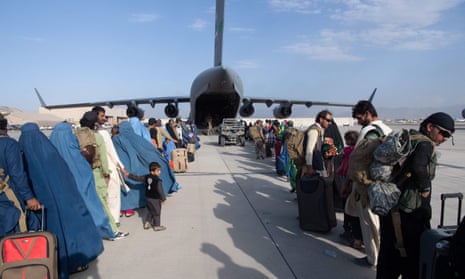He wanted to be Franklin Roosevelt; he ended up as Jimmy Carter. That’s the conventional conservative wisdom on Joe Biden and his handling of the US withdrawal from Afghanistan. “The Afghan debacle will destroy the Biden presidency,” declared one longtime Republican pollster, confident that Kabul 2021 will do to Biden what Tehran 1979 did to Carter.
The assumption is that those initial, chaotic scenes at Kabul airport, with desperate Afghans clinging to planes as they took off, the heartrending stories of faithful servants of the US left to the mercies of the Taliban, and the sight of Afghanistan’s new masters posing with abandoned US military hardware worth billions, will together add up to a humiliation that the American public will not forgive. The assumption is that defeat is unpalatable – and that those images looked like defeat. And that even if that defeat was 20 years in the making, it was Biden left standing at the final hour and so he will bear the blame.
I understand the force of the argument, and yet I’m not convinced. That’s for a variety of reasons – not all of them cheering.
The starting point is that the US electorate accepts Biden’s bedrock case that it was time to end the “forever war” and get out. Both Biden and Donald Trump promised total withdrawal before next week’s 20th anniversary of 9/11, and some 98.1% of US voters gave their approval to that in November 2020. Biden can make, and indeed has made, a powerful defence for any politician: that he was simply keeping his promises.
Except the current debate is not over the whether of withdrawal, but rather the how. Biden is faulted, among other things, for failing to start the evacuation of vulnerable Afghans months ago, so that those at risk could exit alongside the US military, rather than in a frantic scramble after almost all the Americans, and their protective firepower, had gone. The White House can counter that the Afghan government itself opposed any such early exodus, fearing it would spark a crisis of confidence, fuelling a self-fulfilling prophecy that the government was about to collapse and the Taliban take over.
Still, now that the images from Kabul airport are off the TV news, arguments like those will shift to the thinktank and the seminar room. On the wrestling mat of day-to-day politics, Team Biden have plenty of moves: they can say that, after an admittedly shaky start, an airlift of 120,000 in a fortnight was an extraordinary achievement and that it came with relatively little loss of US life.
And that, I’m afraid, is the crucial measure. The Iran hostage crisis was terminal for Carter because the 52 hostages were American, and their 444-day captivity was a long humiliation. It’s true that 13 US service personnel were killed in the August attack by the Afghan offshoot of Islamic State, but it’s the very fact that US soldiers had been dying in Afghanistan since 2001, 2,372 of them in total, that made Americans want to get out in the first place. And now they are out. The ones left behind, the victims of the withdrawal, are Afghans – whether they worked for the US and now fear for their lives, or if they didn’t but simply fear living under a medieval regime. The brute reality is that so long as Americans are unaffected, the lives of foreigners don’t move the needle in US politics.
Republicans have made noise these last couple of weeks, but they can’t easily attack Biden for doing what they planned to do. They can hardly say a 30 August exit was too hasty: on 18 April, Trump was telling Biden he “can and should get out earlier”. Nor can Republicans slam the administration for paving the way for Taliban rule: it was Team Trump that did the deal with the Taliban that boosted its ranks by releasing 5,000 jailed fighters, and cut out the Afghan government altogether.
Nor should Biden get much grief from the left. As MSNBC’s Mehdi Hasan put it, “He evacuated more than 100,000 non-Americans in barely two weeks. He ended US participation in a war that has killed, by conservative estimates, more than 40,000 non-American civilians. He stood up to generals and hawks and defence contractors. All pretty progressive to me.”
So the political obituaries of Joe Biden are surely premature. Unless you want to see the return of Trump in 2024, that should be a relief. And yet, there’s something dispiriting about the logic of it all the same.
For one thing, it may be true that in the calculus of US politics only American lives matter, but that’s a gloomy reality. For another, left cheers for the end of a failed imperialist venture are shortsighted. The US may have left Afghanistan, but that does not signal the end of imperialist interest in the country. The other empires are circling, with China first in the pack, eyeing up Afghanistan’s mineral wealth, estimated at $1tn. If you oppose imperialism itself – rather than just the US variant – it’s a little early to celebrate.
But the other sadness relates to the anniversary that falls next weekend. The wars prompted by the September 11 attacks – in Afghanistan and Iraq – were prosecuted in the name of self-defence: the west would protect itself from al-Qaida bases in one case, from supposed (though nonexistent) weapons of mass destruction in the other. But their advocates made a second argument, presented in terms of the self-interest of the invaded peoples themselves: the US, backed by Britain, would save Afghans from misogynistic theocracy and Iraqis from tyranny. Thus did the warmakers deploy the principle of “liberal interventionism”.
The two rationales became tangled together, and now both are discredited. There are reasons to welcome that. Western intervention has repeatedly made bad situations worse; it’s almost always screamingly hypocritical, given the frequency with which the west intervenes on the wrong side elsewhere in the world; and if the west wants to help, there are non-military things it can do, starting now with a global vaccination effort.
But before Afghanistan and Iraq, there were Kosovo and Sierra Leone, liberal interventions that worked. In the late 1990s, the idea grew that, while you couldn’t bomb countries into embracing democracy or women’s rights, there were times when, faced with the narrow, specific circumstance of a regime bent on murdering its own people, even hundreds of thousands of them, those with the power to stay the killers’ hands had a duty to act.
Now, even as a last resort, that notion has gone, buried in the rubble of Iraq and Afghanistan. Witness the Syrians or Rohingya Muslims, whose pleas to be rescued from slaughter went unanswered. After 9/11, the west intervened blindly and recklessly, and at a terrible price. We live in a different world now. It’s warier – but no less brutal.
Jonathan Freedland is a Guardian columnist
Join Hillary Clinton in a livestreamed discussion with Jonathan Freedland, on the 20th anniversary of 9/11 and the US pullout from Afghanistan. Monday 13 September, 8pm BST | 9pm CEST | 3pm EDT |12pm PDT. Book tickets here

